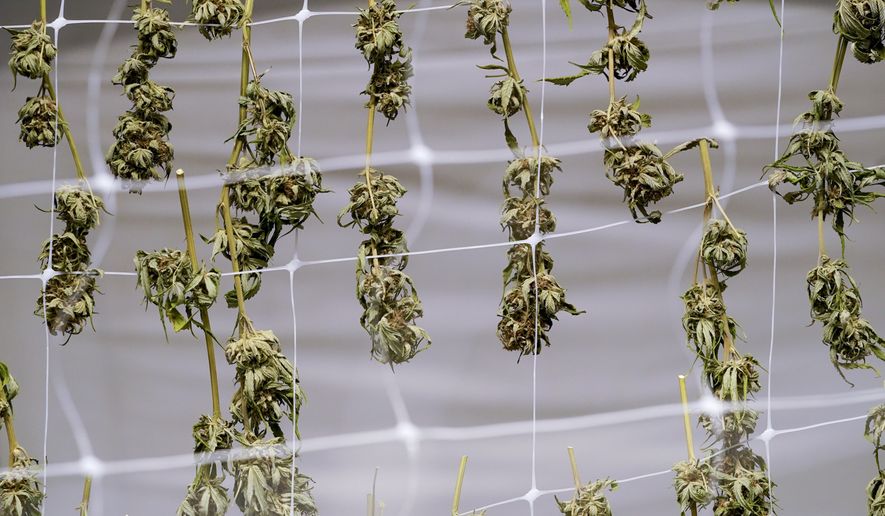Recreational marijuana is legal in 19 states and the number would grow to 24 if voters in Arkansas, Maryland, Missouri, North Dakota and South Dakota approve pot-related measures on the ballot Nov. 8.
The ballot initiatives were largely pushed by pro-cannabis groups such as Legal Missouri 2022 and Responsible Growth for Arkansas. Maryland’s Yes on 4 initiative, urging voters to approve legalizing marijuana in the state, is funded partly by the cannabis dispensary franchise Trulieve.
Polling shows growing public support for legalizing pot use among adults, but also amid increasing concern about youth access to the drug and public safety problems that come with it.
President Biden, who has opposed legalizing marijuana use, sent a strong signal to the states on Thursday when he cited “our failed approach to marijuana” and pardoned more than 6,500 people convicted on federal charges related to simple marijuana possession. Mr. Biden called on governors to pardon similar state-level offenses, and he asked the attorney general to consider reclassifying marijuana as a less-regulated drug.
“Biden put the federal government squarely in one corner,” Jeffrey Miron, a Harvard University economist who studies the impact of marijuana legalization, told The Washington Times. “Not that he advocated for complete repeal of the marijuana laws, but he certainly is nudging in the direction of greater access.”
The states, individually, are leading the way on legalizing pot.
SEE ALSO: Harris: No one should go to jail for ‘smoking weed’
If all five ballot initiatives pass next month, more than half the U.S. population would have legal access to cannabis, said Morgan Fox, the political director for NORML, which advocates for legalizing cannabis.
“There are dozens of states now that have successfully regulated cannabis for medical or adult use. And people are able to see that the sky doesn’t fall,” Mr. Fox said. “This is a substance that can be effectively regulated, like any other product, and it doesn’t make sense to continue to allow the market for cannabis to be controlled by unregulated operators and in some cases, criminal organizations for something that is objectively safer than alcohol and then other states have shown can be regulated.”
Tax revenue is also luring states into considering recreational pot sales. A recent report from the Marijuana Policy Project calculated that states that have legalized cannabis for adult use collected $3.7 billion in taxes last year.
In Maryland, new polling suggests voters will approve a constitutional amendment that would make it legal for people 21 and older to buy marijuana for recreational use. A University of Maryland/Washington Post poll found 73% of registered voters supported the initiative, though approval was skewed toward Democrats and toward younger voters, who are less likely to vote.
If voters approve the amendment, adults would be able to possess up to 1.5 ounces of cannabis or 12 grams of cannabis concentrates beginning in July. Possessing amounts between 1.5 ounces and 2.5 ounces would be subject to civil fines of up to $250, while greater amounts would be subject to existing criminal penalties.
Earlier this year, the state legislature passed a bill that would automatically expunge cannabis cases in which possession was the sole charge. The law would take effect if voters pass the constitutional amendment legalizing adult use.
Maryland is among 37 states that permit people to buy marijuana for medicinal purposes, which requires a physician’s recommendation. Trulieve, which is helping push recreational pot in Maryland, operates three medical marijuana dispensaries in the state.
Trulieve helped fund the pot legalization advocacy group MDCAN 22, which launched the “Yes on 4” campaign, referring to Question 4 on the Maryland ballot.
Former Baltimore Ravens player Eugene Monroe is leading the effort for MDCAN 22 and said legalizing pot “would stimulate Maryland’s economy and create tens of thousands of good-paying jobs, while allowing Maryland residents to benefit from vital investments in education, public health and public safety funded by cannabis taxes.”
Advocates say legalizing pot use would end racial disparities in prosecutions over the drugs. According to the American Civil Liberties Union, nearly four times as many Black people as White people are arrested for possessing pot even though pot use is nearly equal among the two groups.
But there has been pushback by groups concerned about stoned driving, increased crime and pot-addicted youth.
A Boston University study found U.S. vehicle crash deaths involving cannabis use doubled between 2000 and 2018, while the Centers for Disease Control and Prevention warns nearly a third of cannabis users are addicted and that the risk of developing marijuana use disorder is greater among people who start using in their youth.
In Missouri, the effort to legalize recreational pot is less certain. Polls show voters are divided on a ballot measure to change the state constitution and lift a ban on the sale and consumption of marijuana for people over the age of 21. The measure would also expunge the records for some marijuana-related convictions.
In Arkansas, conservatives, including Gov. Asa Hutchinson, are fighting the legalization campaign, arguing it would turn the state into California, where drug use and homelessness plague major cities.
“Following California’s path would be a major mistake for Arkansas,” Sen. Tom Cotton, a Republican, said, citing “crime, more addiction and more traffic fatalities.”
• Susan Ferrechio can be reached at sferrechio@washingtontimes.com.




Please read our comment policy before commenting.